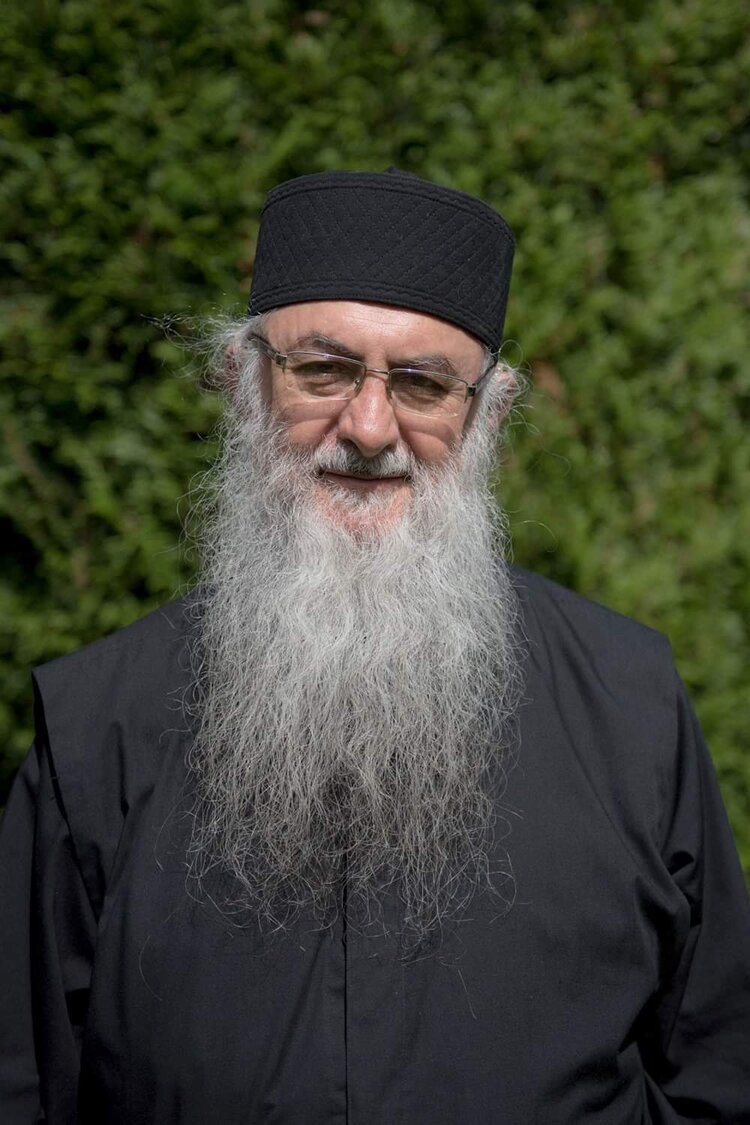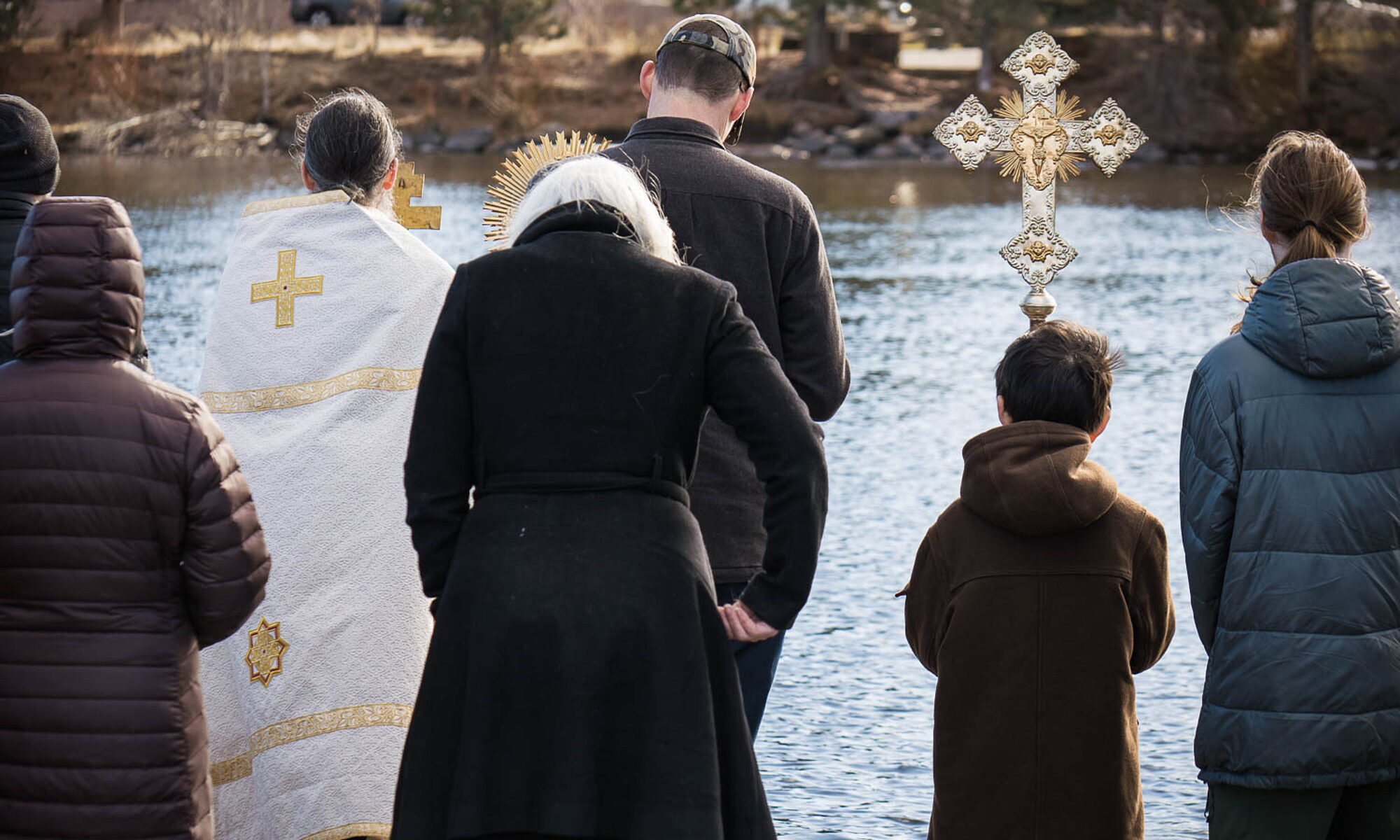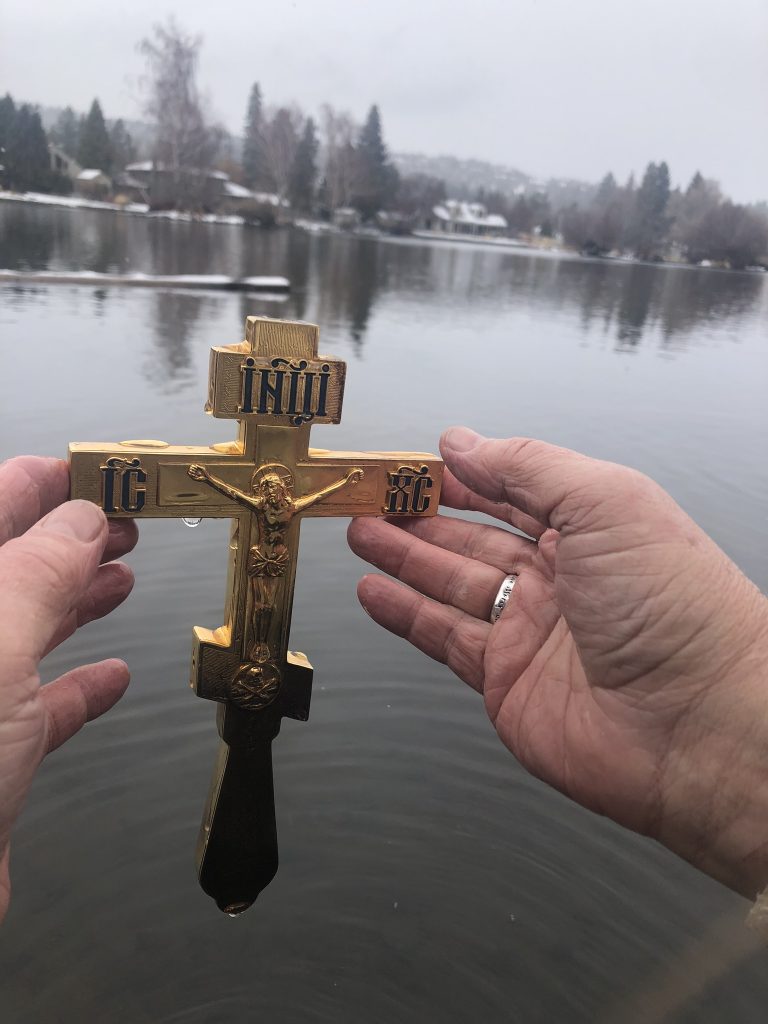
Archbishop Benjamin forwarded to his clergy the text of a homily by Archimandrite Zacharias of Essex, England, a well-known Orthodox monk. Drawing on his spiritual formation under the direction of Elder Sophrony and other Athonite elders, he has many beautiful and powerful things to say about our identity and lives as Christians.
[NOTE: What follows came in two parts, over two days. I have both talks posted together for your ease of reading]
Many people are in confusion and others panic because of the threat of the Coronavirus epidemic that spread in the whole world. I think, however, that this should not happen, for whatever God does with us, He does it out of love. The God of Christians is a good God, a God of mercy and lovingkindness, ‘Who loveth mankind’. God created us out of His goodness in order to share His life and even His glory with us. When we fell into sin, He allowed death to enter our life again out of goodness, so that we may not become immortal in our wickedness, but to seek for a way of salvation. Although we have fallen, God has never stopped to provide for us, not only material goods in order to sustain our race, but He also sent prophets and righteous, preparing His way so that He might come and solve our tragedy, and bring eternal salvation through the Cross and Resurrection of His inconceivable love. He came and took upon Himself the curse of sin, and He showed His love to the end: ‘Having loved His own which were in the world, He loved them unto the end’ (John 13:1). All the things that God did when He created us, when He provided goods in order to sustain the world, when He prepared His way for Him to come on earth, when He came Himself in person and wrought our salvation in such an awesome way, all these things He did out of goodness. His goodness is boundless. He saves us and is so longsuffering towards us, waiting until we ‘come to the knowledge of the truth’ (1 Tim. 2:4) and bring true repentance, so that we may be with Him for all eternity. Thus, at every stage of His relationship with man, our God shows only His goodness and mercy, ‘which is better than life’ (Ps. 63:3); goodness is His Nature and He does all things for the benefit and salvation of man.
Consequently, when He shall come again to judge the world, will a different God judge it? Will it not be the same good God, the God of mercy and lovingkindness, Who loves mankind? Let us be certain that we shall not appear before any other God than Him Who created us and saved us. And so, it is again with the same mercy and love that He will judge us. For this reason, we should neither panic nor waver, for it will be the same God that will receive us in the other life and will judge us with the same kindness and compassion. Some fear that the hour of their end has come. This plague of Coronavirus has also a positive aspect, because we have a few weeks from the moment it will assail us until our end. Therefore, we can dedicate this time to prepare ourselves for our meeting with God, so that our departure may not occur unexpectedly and without preparation, but after we have run through our whole life each time we stand in prayer before God, at times with thanksgiving unto the end for all the things God has done for us and at other times with repentance, seeking the forgiveness of our transgressions. Nothing can harm us with such a God, Who allows all things out of His goodness. We must simply keep thanksgiving unto the end and the humble prayer of repentance for the forgiveness of our sins.
As for myself, this plague is helping me. I longed to find again the prayer I had before, with which I can run through my whole life from my birth until now, thanking God for all His benefits ‘whereof I know and whereof I know not’; and also, with which I can run through my whole life repenting for all my sins and transgressions. It is wonderful to be able to run through your life praying, bringing all things before God with persistence in prayer. Then you feel that your life is redeemed. This is why this situation is truly helping me. I am not panicking but ‘I will be sorry for my sin’ (Ps. 38:18).
We must see the goodness of God in all the things that are happening now. The Holy Fathers did see His lovingkindness. A similar epidemic occurred in the 4th century in the Egyptian desert, which harvested more than a third of the monks, and the Fathers were saying with great inspiration that, ‘God is harvesting souls of saints for His Kingdom,’ and they did not waver. The Lord Himself speaks in the Gospel about the last days, about the trials and afflictions which the world will go through before His Second Coming. However, we discern neither morbid sadness nor despair in His words. The Lord Who prayed in the garden of Gethsemane with a sweat of blood for the salvation of the whole world, says that when we see the terrible things that precede His Second Coming, we should lift up our heads with inspiration, for our redemption draws nigh (cf. Luke 21:28). Some tell me, ‘May God extend His helping hand.’ But this is precisely the hand of God. He desires and works our salvation ‘at sundry times and in divers manners’ (Heb. 1:1): ‘My Father worketh hitherto, and I work’ (John 5:17). This virus may be a means that God uses in order to bring many to themselves and to repentance, and to harvest many ready souls for His eternal Kingdom. Therefore, for those who surrender and entrust themselves to the Providence of God all will contribute for their good: ‘All things work together for good to them that love God’ (Rom. 8:28).
Thus, there is no room for morbid dismay. Neither should we resist the measures that the government is taking in order to diminish the spreading of the afflictions we see in the lives of so many people. It is wrong to go against the authorities. We should do whatever the Government says, because they are not asking for us to deny our faith, they are only asking us to take a few measures for the common welfare of all people, so that this trial may pass, and this is not at all unreasonable. Some people take it too confessionally, they raise flags and play the martyrs and the confessors. For us there is no doubt: we shall show pure submission to the orders of the Government. It is unfair to disobey the Government since, when we fall ill, it is to their hospitals that we run and they are the ones who undertake all the expenses and our care.
[Above is the first part of an address by Archimandrite Zacharias of Essex, England, and the following day its concluding part was given and appears below.]
This is the ethos of Christ that God showed in His life on earth and this is the apostolic commandment that we have received: ‘…be subject to principalities and powers, obey magistrates, be ready to every good work, speak evil of no man, be no brawlers, but gentle, shewing all meekness unto all men’ (cf. Tit. 3: 1-2); and ‘Submit yourselves to every ordinance of man for the Lord’s sake: whether it be to the king, as supreme…’ (see 1 Pet. 2:13-17). If we do not obey our governors who are not asking much, how will we obey God, Who gives us a divine law, which is far more sublime than any human law? If we keep the law of God we are above human laws, as the apologists of the 2nd century said during the Roman Empire which was persecuting the Christians. It is surprising to see in the country where we live, in the United Kingdom, that the footballers show such understanding and discernment so as to be the first to withdraw from their activities with docility towards the indications of the Government to take prophylactic measures. It would be sad for us, people of faith, to fail reaching the measure of the footballers and showing the same docility towards the authorities for which our Church prays.
If they ask us to stop our Church services, let us simply surrender and bless the Providence of God. Besides, this reminds us of an old tradition that the Fathers had in Palestine: in Great Lent, on the Sunday of Cheese fare, after the mutual forgiveness, they would go out in the desert for forty days without Liturgy; they would only continue in fasting and prayer so as to prepare and return on Palm Sunday to celebrate in a godly way the Passion and the Resurrection of the Lord. And so, our present circumstances force us to live again that which existed of old in the bosom of the Church. That is to say, they force us to live a more hesychastic life, with more prayer, which will however make up for the lack of the Divine Liturgy and will prepare us to celebrate with greater desire and inspiration the Passion and Resurrection of the Lord Jesus. Thus, we will turn this plague into a triumph of hesychasm. In any case, whatever God allows in our life is out of His goodness for the well-being of man, for He never wants His creature to be harmed in any way.
Certainly, if we will be deprived of the Divine Liturgy for a longer period of time, we can endure it. What do we receive in the Liturgy? We partake of the Body and Blood of Christ, which are filled with His grace. This is a great honour and benefit for us, but we also receive the grace of God in many other ways. When we practice hesychastic prayer, we abide in the Presence of God with the mind in the heart calling upon the holy Name of Christ. The Divine Name brings us the grace of Christ because it is inseparable from His Person and leads us into His Presence. This Presence of Christ which is purifying, cleanses us from our transgressions and sins, it renews and illumines our heart so that the image of God our Saviour, Christ, may be formed therein.
If we shall not have Easter in the Church, let us remember that every contact with Christ is Easter. We receive grace in the Divine Liturgy because the Lord Jesus is present in it, He performs the sacrament and He is the One imparted to the faithful. However, when we invoke His Name, we enter the same Presence of Christ and receive the same grace. Therefore, if we are deprived of the Liturgy, we always have His Name, we are not deprived of the Lord. Moreover, we also have His word, especially His Gospel. If His word dwells continually in our heart, if we study it and pray it, if it becomes our language with which we speak to God as He spoke to us, then we shall have again the grace of the Lord. For His words are words of eternal life (John 6:68), and the same mystery is performed, we receive His grace and are sanctified.
Furthermore, each time we show kindness to our brethren the Lord is well-pleased, He considers that we did it in His Name and He rewards us. We show kindness to our brethren and the Lord rewards us with His grace. This is another way in which we can live in the Presence of the Lord. We can have the grace of the Lord through fasting, alms giving and every good deed. So, if we are forced to avoid gathering in Church, we can also be united in spirit in these holy virtues which are known within the Body of Christ, the holy Church, and which preserve the unity of the faithful with Christ and with the other members of His Body. All the things we do for God is a Liturgy, for they minister unto our salvation. The Liturgy is the great event of the life of the Church, wherein the faithful have the possibility to exchange their little life with the boundless life of God. However, the power of this event depends on the preparation we perform before, through all the things we have mentioned, through prayer, good deeds, fasting, love for neighbour, repentance.
Therefore, my dear brethren, it is not necessary to make heroic confessions against the Government for the prophylactic measures that it takes for the good of all people. Neither should we despair, but only wisely machinate ways so as not to lose our living communication with the Person of Christ. Nothing can harm us, we must simply be patient for a certain period of time and God will see our patience, take away every obstacle, every temptation and we shall again see the dawn of joyful days, and we shall celebrate our common hope and love that we have in Christ Jesus.


